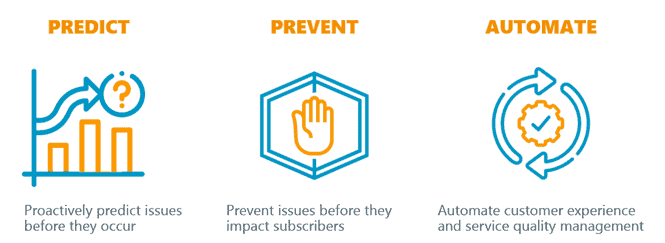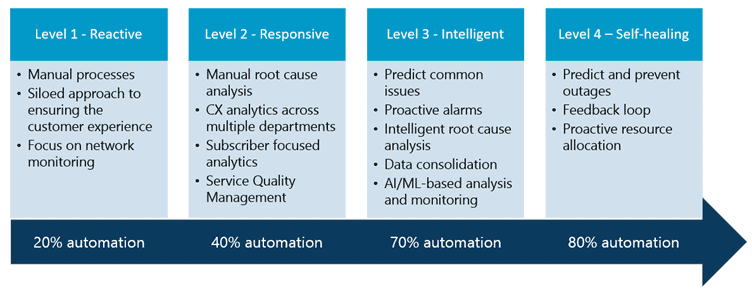Introduction
In today’s 5G digital landscape of constant evolution, the network’s infrastructure, ongoing operation, and management are becoming exponentially complex. Yet, one thing remains the same: the demand for a superior customer experience.
As 5G new use cases such as autonomous cars, smart cities, telehealth services, and remote operation of machinery enabled by edge and slicing are introduced into the network, the number of connected devices keeps increasing. At the same time, customers are consistently demanding a high quality of service for voice, data, and video.
Amid this increasing density and complexity, in managing their new 5G networks, operators have minimal time to resolve issues and suffer high costs for errors. Furthermore, a degradation such as one hour of network downtime at an enterprise customer network can cause a significant loss in revenue, amounting to millions of dollars.
As an operator, to gain a competitive edge and optimize operational costs in the long term, you need to proactively know if the customer experience starts to degrade and to be able to analyze why it’s happening. To do so, you need to make sense of billions of data points and then take corrective action before network performance degradations turn into issues that impact your subscribers.
Thus, it is apparent that for 5G, the traditional network operations and management model will not meet the increasing requirements needed. Instead, the 5G network emphasizes a more personalized customer experience and guarantees a certain quality of service, which calls for a new way of proactively monitoring network performance at scale. Many aspects of this new approach will come in the form of automated assurance enabled by AI and Machine Learning.
Monitoring network performance data E2E
While operators already have existing monitoring solutions in place, many are focused on reactive operations, manually monitoring events and alarms instead of monitoring E2E performance data. That’s because, in the past, the possibility of automated performance monitoring at scale was not possible. Now, with fast, low cost compute, and AI technology maturing, this is changing.
To add another layer to existing network monitoring solutions, operators should integrate an AI/ML-based assurance solution to monitor their customers’ experience proactively. A solution that can automatically detect critical incidents before they impact subscribers, thus ensuring the required network conditions to deliver high-quality services.
Such a solution would monitor performance data at a granular level while using AI to analyze the data and find anomalies, automatically moving network operations from reactive to proactive operations. This approach also analyzes data patterns over time and finds patterns to learn, improve, and identify the root cause more accurately. This would lead to the early resolution of degradations, enabling engineers to handle critical customer-affecting issues rather than “alerts” that do not affect subscribers.
AI/ML-based automated network insights
AI and ML are essential for intelligent network operations and managing the customer experience in 5G. Furthermore, for more advanced 5G services like dynamic network slicing creating rules and policies that proactively prevent and resolve issues will be vital. All this is part of the operators’ goal to introduce higher levels of automation into their network’s ongoing operation and maintenance tasks.
Automated insights provided by AI/ML will feed into the operators’ orchestration to allow this approach, which saves on OPEX and automatically ensures network quality, delivering high-quality services while optimizing engineering workloads. Thus, operators can transition to closed-loop network operations, managing their network end-to-end according to strict SLAs or customer experience policies. So, how do operators best acquire these AI/ML-driven insights into their network?
The critical role of proactive, AI/ML–driven assurance
When thinking about optimizing network performance E2E, we must combine proactivity with automation. By deploying automated service assurance solutions with built-in AI/ML, you can proactively start predicting network issues before they occur and impact subscribers and automate service quality management.

Proactive assurance critical role
Automated assurance powered by AI/ML enables quick and effective network and service performance validation by analyzing immense amounts of data generated by the network, moving from a reactive to a proactive network operations approach. It also provides end-to-end network troubleshooting from the KPI level down to the session/packet level. In addition, AI-driven assurance solves complex pattern recognition problems and learns to detect patterns over time and across different data sources to identify the root cause.
Assurance solutions with built-in AI/ML would offer you the following key benefits:
- Resolve faults automatically and resolve issues before subscribers are affected
- Enrich the insights driving a given process by automating the flow and correlation of data across data sources and network domains
- Optimize network performance from launch to ongoing operations, while continuously improving ML/AI-driven open- or closed-loop orchestration
- Deliver faster business processes by transitioning from manual activities to automated workflows, and, thus, saving engineering teams valuable resources
- Introduce automated decision-making to optimize costs without sacrificing performance.
- Optimize business outcomes, guaranteeing agreed-upon SLAs and QoEs, through closed-loop automation operations.

The transition from reactive to proactive network operations
Such assurance solution components can be orchestrated by Kubernetes, which automates the solution for on-demand instantiation, scaling, healing, and updates to ensure services are constantly monitored while being resource-efficient. Hence, operators can optimize their network more efficiently without the need for manual adaptation, accumulating experience over time to an automated, closed-loop approach for network management.
Monitor what matters
From optimizing network ROI to accelerating services roll-outs and monetizing new revenue streams, with AI/ML-driven insights and automation, you can:
- Accelerate and optimize new services roll-outs while targeting your investments for maximum returns.
- Differentiate your service offering portfolio while introducing new revenue streams.
- Establish automated decision-making processes to optimize operational costs without sacrificing your network’s performance.
- Offer a more personalized, superior customer experience.
Summary
In conclusion, to overcome 5G network challenges, operators will need to utilize an automated, AI/ML-based assurance solution that can smartly monitor network performance data E2E. Such a solution can analyze the data generated by the network at a granular level, automatically identify issues’ root causes to optimize network performance.
RADCOM ACE is our automated assurance solution that seamlessly integrates into the 5G core as a Cloud-Native Function (CNF) and provides real-time subscriber analytics and E2E troubleshooting capabilities. By leveraging built-in AI and machine learning capabilities, it provides operators with an understanding of the actual customer experience. In addition, it automates the optimization of network quality, improving network uptime by an average of ~10-15%.
Furthermore, our solution enables teams to perform pre-emptive rather than reactive maintenance. This frees up engineers’ time to focus on more customer-affecting issues, improving maintenance efficiency, saving up to 10% OPEX.
Being dynamic and fully integrated enables operators to take an on-demand, closed-loop approach to unlock the full potential of 5G and assure a superior customer experience.
To learn how to assure the lifecycle of your 5G network download our infographic.
This article is subject to RADCOM’s disclaimers regarding Forward-looking statements and general information under the links below:

